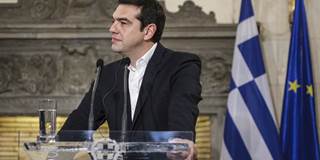 Martin Schulz/Flickr
Martin Schulz/Flickr
失败的希腊援助
美国剑桥—随着希腊危机的演进,一个很重要的要点是明白成功的结构调整方案需要强大的国家所有权(ownership)。即使谈判者克服了最近的症结,如果说服不了希腊人民,也很难信任调整方案的实施。显然,目前的经验就是如此。而如果没有结构改革,希腊经济就无从实现持续稳定和增长——官方贷款人不愿给予不实施改革的希腊远远多于要求它偿还的资金。(大部分危机都是如此,尽管也许无法从全球媒体报道中了解这一点。)
希腊的欧盟成员资格给了其债权人很大的杠杆(leverage),但显然仍不足以改变基本面。希腊仍然是主权国家(country)而不是次主权的邦国(state)。“三驾马车”债权人——IMF、欧洲央行和欧盟委员会——在希腊问题上并没有获得类似于20世纪70年代市政援助公司(Municipal Assistance Corporation)在纽约市濒临破产时所获得的杠杆。
最好的结构调整计划应该让债务国政府实施政策变化,并由IMF帮助设计定制方案和提供实施方案的政治掩护。从外部实施这些政策绝非有效方法。因此,要想巩固改革,希腊政府及其选民必须相信改革政策。
https://prosyn.org/xJlbsRCzh
To continue reading, register now. It’s free!
Register Now
Already have an account?
Log in



美国剑桥—随着希腊危机的演进,一个很重要的要点是明白成功的结构调整方案需要强大的国家所有权(ownership)。即使谈判者克服了最近的症结,如果说服不了希腊人民,也很难信任调整方案的实施。显然,目前的经验就是如此。而如果没有结构改革,希腊经济就无从实现持续稳定和增长——官方贷款人不愿给予不实施改革的希腊远远多于要求它偿还的资金。(大部分危机都是如此,尽管也许无法从全球媒体报道中了解这一点。)
希腊的欧盟成员资格给了其债权人很大的杠杆(leverage),但显然仍不足以改变基本面。希腊仍然是主权国家(country)而不是次主权的邦国(state)。“三驾马车”债权人——IMF、欧洲央行和欧盟委员会——在希腊问题上并没有获得类似于20世纪70年代市政援助公司(Municipal Assistance Corporation)在纽约市濒临破产时所获得的杠杆。
最好的结构调整计划应该让债务国政府实施政策变化,并由IMF帮助设计定制方案和提供实施方案的政治掩护。从外部实施这些政策绝非有效方法。因此,要想巩固改革,希腊政府及其选民必须相信改革政策。